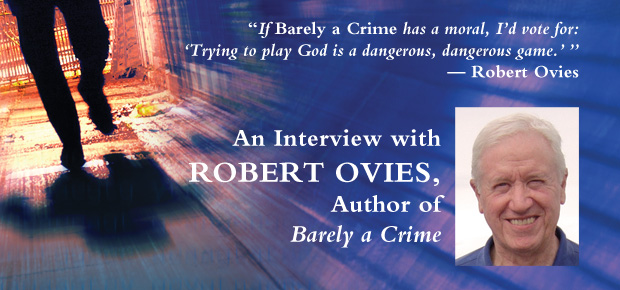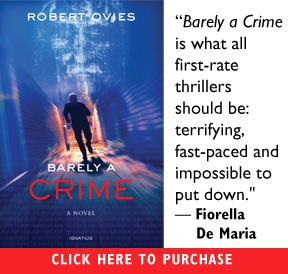
Robert Ovies’ first novel, The Rising, was acclaimed by readers as the sort of fast-paced thriller that grabs you from the first page and doesn’t let go until you’ve reached the back cover. His new novel, Barely a Crime, (read the first chapter here) is another spiritual thriller with even higher stakes. But we can’t say much more: spoilers. Ignatius Press Novels spoke with the author about his novel, his writing process, and more.
I don’t want to give too much away about the plot of Barely a Crime in this interview, since mystery is a key part of your book. But suffice it to say that like your first novel with Ignatius Press, The Rising, your new novel, Barely a Crime, is also a thriller with spiritual overtones. Is that correct?
Ovies: That’s correct. Both The Rising and Barely a Crime are stories in which the key characters are either forced to, or have made the decision to try and work their way through, a situation having dramatic spiritual overtones, that no one else has ever had to work their way through before. High risks with dramatic spiritual overtones and no road map from previous experiences telling them how to get through it safely.
In reading Barely a Crime, two things came to mind to me: classic “heist gone wrong” movies, and writers such as Dean Koontz. What were your influences going into the writing of this book?
Ovies: What I feel attached to and influenced by, in books or films or stage plays, etc., are the characters that have been created. I recognize and certainly enjoy powerful storylines, but watching how certain characters that I can somehow identify with, try to move through the various currents that life sweeps them along is what I’m most drawn to and best remember. If, in ten years, a few readers still remember feeling a kind of bonding with C.J. Walker in The Rising or with Kieran Lynch or Marie Groves in Barely a Crime, that would be pretty special.
The main characters in Barely a Crime have the notion that a small infraction of the law (or morality) is worth the risk if the pay is right. But things start to escalate rather quickly from there until the situation spins beyond their control. Do you think the urge to rationalize our own misdeeds is something that comes naturally to us?
Ovies: It comes as naturally, I’m afraid, as our drives for self-enhancement, grateful applause or survival itself. (Talk about biblical overtones.) I suspect that a clear majority of us can remember times in our own experiences when what we saw at that time as just a small infraction of our moral code in fact rose up to threaten repercussions both unwanted and well beyond our personal control. If Barely a Crime has a moral, I’d vote for: “Trying to play God is a dangerous, dangerous game.”
 Both of your books are extremely “cinematic” in feel; you can easily imagine a movie being made based on either of them. The pacing is quick and the scenes unfold in logical succession, with just enough mystery left at the end of each chapter to make it really quite difficult to set the book down. How do you capture that feeling and narrative drive in print?
Both of your books are extremely “cinematic” in feel; you can easily imagine a movie being made based on either of them. The pacing is quick and the scenes unfold in logical succession, with just enough mystery left at the end of each chapter to make it really quite difficult to set the book down. How do you capture that feeling and narrative drive in print?
Ovies: The characters create the drive, I think, and the energy depends to some real degree on how closely we relate to one or more of them as they try to work past their hard memories pressing against their still-high aspirations, and their still-healthy edges staring down the “holes in their soul”. Wanting to move with that tension, and see how it works out, I believe, is what generates the kind of “feeling and narrative drive” you referred to.
Let’s talk a little about your crafting of the book. When we talked about The Rising, you said: “I didn’t have it all mapped out before I began writing. I imagined, and then I wrote until I stopped to imagine again, at which time I was off again, although from a then-fresh jumping-off spot.” Was working on Barely a Crime a similar process?
Ovies: It was. Again, I just tried to describe how a very limited number of relatable characters might respond if they came face-to-face with the kind of “just one foot over the line” choice that you mentioned above. Would the guaranteed pay-off effectively erase any sense of hesitation, even if no one else had ever attempted what they’d be obligated to do? I’d think that through until I was satisfied, then I’d write again until I wouldn’t quite know what they’d do next. When the lights would go on, which they always did, I’d be off once again. I have to admit, it’s really an enjoyable way to work on a thriller.
Barely a Crime is a globe-trotting story, going from Ireland to Italy to the United States. What kind of research did you do to recreate these locations on paper?
Ovies: I’ve known some detail about the characters — their locations, their predictable lifestyles and so forth — from the start. But the world of the internet is a marvel, isn’t it? You want to know what they drink in their pub, you’re there. You want to go into a famous building, you’re there. You want to review the latest detail that world-renowned experts have learned about subjects A, B or C, you’re there. You want to drive around a city, you’re there. It’s wonderful, isn’t it?
The book features a fair amount of technical and medical information, from the tools used in a pivotal heist scene to the biological and scientific methodology being used by the main antagonist. What kind of research did you do to make these plausible to the reader?
Ovies: Again, the internet is the magic source for, if not all, at least a lot of the above. I was also blessed to “meet,” via the web, a few “experts in their fields” who stay up-to-date with the specific areas of experimentation that are most critical to the story, and those individuals were more than willing to share information regarding development techniques, present targets and expectations, and other details that were important to the story. To a person, they were glad to help, and, if any of them happen to be reading this, “Thanks again, very, very much!”






Leave a Reply